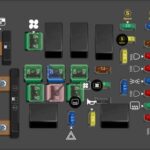It’s a common question among boat owners, especially those familiar with car maintenance: Can you use a standard OBD2 scanner to diagnose issues with your boat engine? The appeal is understandable – OBD2 scanners are readily available and relatively affordable, making DIY diagnostics seem within reach. This article will explore whether a standard OBD2 scanner, possibly with a Volvo-to-OBD2 adapter, can effectively troubleshoot your boat’s engine, particularly Volvo Penta models.
Many boat owners, like the user in the forum seeking advice on a Volvo-to-OBD2 adapter, hope for a simple solution to engine diagnostics. They see similarities between car and boat engines and wonder if the same diagnostic tools can be applied. After all, modern boat engines often incorporate technology similar to automotive engines. The idea of using a cheap adapter with an existing OBD2 scanner is certainly attractive for cost-conscious boaters.
However, the reality of marine engine diagnostics is more complex than simply plugging in a generic OBD2 scanner. While automotive OBD2 systems have become standardized for cars and trucks, marine engines operate under different protocols and standards.
Marine Engines and Diagnostic Standards: Beyond OBD2
The key difference lies in standardization. The automotive industry widely adopted OBD2 to meet emissions regulations and provide a common interface for diagnostics. This standardization ensures that any OBD2 compliant scanner can read basic diagnostic codes from any OBD2 compliant vehicle, regardless of manufacturer.
Marine engines, on the other hand, haven’t followed the same path to standardization. While some marine engine manufacturers might use diagnostic protocols that bear similarities to OBD2, they are generally not fully compliant with the automotive OBD2 standard. This means that a standard OBD2 scanner, designed for cars and trucks, may not be able to communicate effectively with your boat engine’s computer (ECU or ECM).
In the context of Volvo Penta engines, which are popular in many boats, it’s important to understand their diagnostic systems. Volvo Penta, like other marine engine manufacturers, often uses proprietary diagnostic systems. These systems might utilize different communication protocols, such as J1587 or proprietary CAN bus variations, which are not directly compatible with the standard OBD2 protocols (like J1850, CAN, ISO 9141-2, and KWP2000) used in automobiles.
The Volvo-to-OBD2 Adapter Myth: Why It Likely Won’t Work
The forum user inquired about a Volvo-to-OBD2 adapter, hoping it would bridge the gap between their Volvo Penta engine and their OBD2 scanner. While such adapters physically change the connector, they don’t magically translate communication protocols.
Think of it like this: an adapter is like a language translator for physical plugs, not for languages themselves. If your Volvo Penta engine “speaks” a different diagnostic language (protocol) than your OBD2 scanner “understands,” simply changing the plug won’t enable communication. The adapter might physically connect the devices, but the scanner will likely not receive or interpret the data from the engine’s ECU because it’s expecting data in a different format.
As pointed out in the forum discussion, adapters marketed for Volvo trucks are unlikely to work for Volvo Penta marine engines. Even within Volvo’s product lines, different divisions may use different diagnostic systems. Marine engines often have unique requirements and operate in harsher environments, leading to distinct diagnostic approaches compared to on-road vehicles.
Marine Diagnostic Tools: Investing in the Right Equipment
For proper diagnostics of your boat engine, especially a Volvo Penta, you’ll likely need to invest in marine-specific diagnostic tools. These tools are designed to communicate with the specific protocols and systems used in marine engines.
Companies like Rinda Technologies specialize in marine diagnostic tools and software. They offer scan tools that are compatible with various marine engine brands, including Volvo Penta. These tools can read engine codes, monitor engine parameters, and perform other diagnostic functions that a generic OBD2 scanner simply cannot.
While marine diagnostic tools can be more expensive than basic OBD2 scanners, they are essential for boat owners who want to accurately diagnose and troubleshoot engine issues themselves. Attempting to use incompatible tools or adapters can lead to frustration and inaccurate readings, potentially hindering proper repairs.
Conclusion: Marine OBD2 – Proceed with Caution
In conclusion, while the idea of using a standard OBD2 scanner on your boat engine is appealing, it’s generally not a viable solution, especially for Volvo Penta and similar marine engines. Marine engines often use different diagnostic protocols than automobiles, and simple Volvo-to-OBD2 adapters are unlikely to bridge this gap effectively.
For reliable boat engine diagnostics, it’s best to use marine-specific scan tools and software designed for your engine brand. Investing in the right tools or seeking professional marine mechanic services will ensure accurate diagnoses and effective repairs, keeping you safely on the water. While the dream of a universal “Boat Obd2” solution might exist in the future, for now, specialized tools are the key to unlocking your marine engine’s diagnostic secrets.
